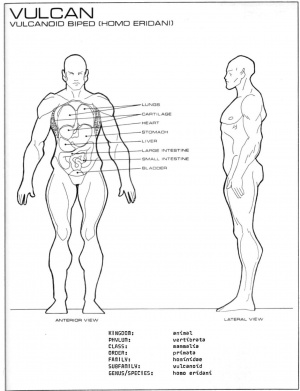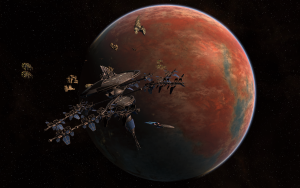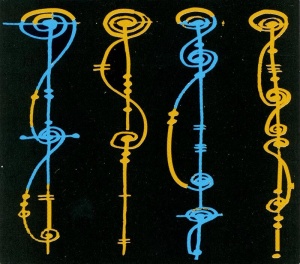Vulcan
From Star Trek: Theurgy Wiki
The Vulcans were a stoic, rational people. Widely claimed to be emotionless, in truth the Vulcans felt deeply and intensely, to their own detriment. Their stoicism came from a culture of logic and self-discipline, where emotions were analyzed and dissected to rob them of their potency so that they could not overwhelm or control the individual. Vulcans embraced science and reason, but their lives were not purely devoted to logic: they also had a deeply philosophical side, with art and music as vital to their culture as logic. They were also intensely private people, with many aspects of their culture — such as the rites of Pon Farr — which were not discussed amongst outsiders.
Psychology
Vulcans exalted logic over emotion and usually repressed or sublimated emotions in their daily behavior. Vulcans who dealt with non-Vulcans on a regular basis often maintained an almost glacial calm, possibly as self-defense against so much unguarded feeling. Among themselves, however, Vulcans usually seemed more relaxed; Vulcan ambassadors often cultivated a kind of distant good humor and politesse. Even Vulcan ambassadors, however, had trouble predicting or depending upon the behavior of more emotional species.
Physical Description
Vulcans closely resembled Humans, with the same average height and weight. Their pointed ears were slightly larger than the Human norm, and their slanted eyebrows sometimes gave them a questioning look. The inner, or nictitating, eyelid was not visible. Vulcan skin complexions ranged from olive to dark mahogany, with a green cast provided by their copper-based blood. The Vulcan heart rested in the lower center of the torso, surrounded and protected by highly efficient lungs.
Reproduction
Homeworld
The planet Vulcan (or Ti-Valka'ain, in the Vulcan language) was the second plant of six orbiting the orange star 40 Eridani A (part of a trinary system; the other two stars were too far away to be immediately visible in Vulcan's sky). Vulcan was a harsh, desert world (barely a quarter of the surface area was water) with a thin atmosphere and high (1.4 G) gravity. Vulcan's geology produced starkly upthrust mountains: craggy, inhospitable, and inspiring to the planet's ascetic logicians and mystics alike. The capital city of Vulcan, ShirKahr, was a low, stark city laid out in logical grids and quarters around an ancient oasis.
Vulcan Ecology
Temperature and Climate
Flora and Fauna of Vulcan
Geography
Culture
Art
Architecture
Cuisine
Religion
The Twilight of the Gods
The Inner Chorus
T'plana-Hath and the Birth of Vulcan Logic
The School of Surak
The Way of Jarok
The School of Nirak
The One Mind School
The Kolinahr Path
The Hakihr Way
Katra: The Vulcan Soul
History
The Age of Antiquity
The Time of Awakening
Rift with the Proto-Romulans
The Golden Age
The Romulan War
To the Stars
First Contact with Humanity
The Federation
Government
The Vulcan Council
Elections and Impeachment
Council Functions
The Ministry of State
The Ministry of Defense
The Ministry of Security
The Ministry of Health
The Ministry of Thought
The Ministry of Science
The Ministry of Trade
Vulcan Diplomacy
The Vulcan Isolationist Movement
Language and Names
Vulcan and Federation Standard was the dominant language spoken by Vulcans.
Vulcans used only given names, though in ritual greetings they added their parent's name (and sometimes more), as in Spock, son of Sarek, son of Solkar. Even Vulcans of extremely ancient and powerful families used no honorifics; aristocracy was illogical, and logically, anyone worth impressing should already know who you were without being reminded of your family's status.
Male Names
Delvok, Kov, Lojal, Sakar, Sakkath, Sanshiin, Sarek, Satelk, Satok, Savar, Skon, Solkar, Solok, Sonak, Sopek, Soral, Soval, Spock, Stonn, Surak, Sybok, Tavin, Tolaris, Tuvok, Vanik, Vorik
Female Names
Saavik, Sakonna, Selar, Senva, Sitak, T'Lar, T'Lara, T'Pan, T'Para, T'Pau, T'Pel, T'Penna, T'Pera, T'Plana-hath, T'Pol, T'Pring, T'Shanik, Tallera, V'Lar, Valeris




